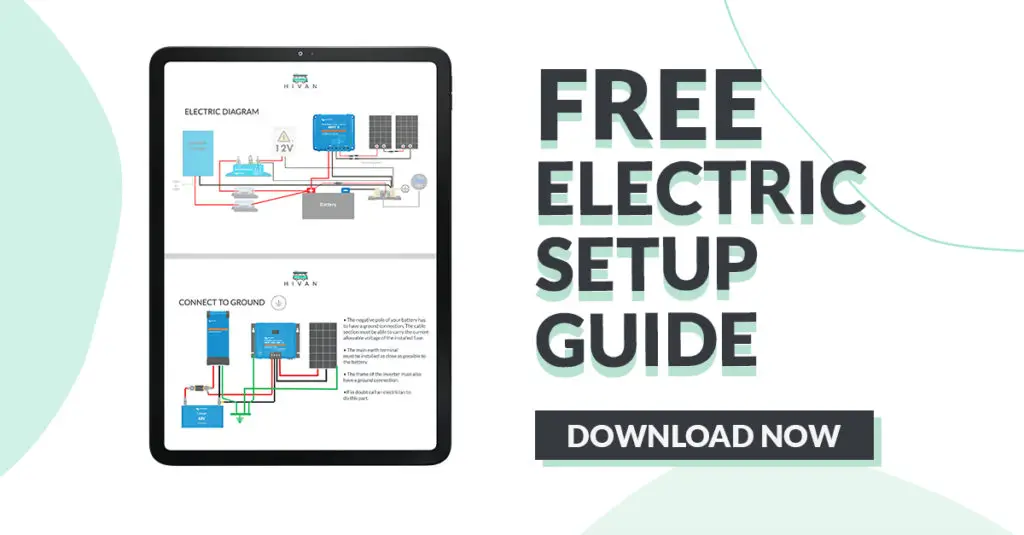Hi-van is supported by its audience. When you purchase using our links, we may earn an affiliate commission (no added cost to you). Learn more
Eggs are a fantastic source of protein and a popular, delicious, and cost-effective food for camping. However, you must take pains to store them correctly; otherwise, your eggs will spoil (or break) long before you get to eat them.

Store-bought eggs can last between three and five weeks while camping, as long as they are constantly refrigerated. Cooked eggs must be kept cool and can last for up to two days, while farm-fresh eggs don’t require refrigeration and can last up to a month.
This article will explain in more detail how long eggs last while camping and how you should store each kind of egg.
What Is the Shelf Life of Eggs?
We need to look at their shelf life before we can definitively answer how long eggs will last while camping.
When stored correctly and refrigerated, eggs can last between three and five weeks. Eggs can also typically last for around three to four weeks beyond the stated “best before” date.
This means that you can safely store eggs in a cooler while camping. As long as the cool temperature is maintained, store-bought eggs should last your entire trip. Of course, this depends on when you bought them and what the “best before” date indicates.
If you notice that your cooler’s ice is starting to melt, use them up within 24 hours, as this will have broken the cold chain.
How To Store Eggs While Camping
Storing your eggs correctly while camping is essential to ensuring that they are still good to use when you want to cook or eat them.
According to the CDC (The US Centers for Disease Control), you should keep store-bought eggs at 40 °F (4.44 °C) or colder.
This ensures that your eggs are always cool, keeps out contaminants, and prevents bacterial growth.
If eggs have been left at room temperature around 68 °F (20 °C) for more than two hours, they should not be used.
The same is true for eggs that have been exposed to temperatures higher than 90 °F (32 °C) for longer than one hour.
When eggs are not stored correctly, this can result in E-Coli and Salmonella bacteria formation, which can make you seriously ill.
However, the way you store your eggs while camping and how long they will last will depend on the type of egg you’re bringing and in which form.
Here is how to store the different egg types while camping:
Fresh Store-Bought Eggs
When bringing store-bought eggs with you while camping, be sure to store them in a cooler that provides constant refrigeration.
If you’re using ice or ice packs in your cooler, keeping them frozen is essential. Since ice starts to melt at 32 °F (0 °C), you’d need to keep your cooler’s temperature lower than this.
To help achieve this, you should avoid placing the cooler in direct sunlight and not store it in the car when you arrive at the campsite. A cool and shady spot under the trees is the perfect place for a cooler.
How often the cooler is opened also affects the temperature inside. Storing drinks or other often-used perishables in the cooler may not be a good idea as it will probably be opened and closed often. An excellent alternative is to store your eggs in a separate cooler with other items that are prone to spoiling.
If you can, try to pack your eggs towards the bottom of the cooler, where the temperature is typically lower.
Store-bought eggs can last between three and five weeks. Keeping your store-bought eggs cool therefore means that they can last your entire trip.
Fresh Eggs From the Chicken Coop
If you’ve managed to source freshly laid eggs from a farm or chicken coop for your camping trip, you’re in luck!
Fresh eggs do not need refrigeration as they haven’t been commercially sanitized. Egg sanitizing removes the natural protective mucous layer around the egg. When this protective layer is removed, the egg is porous and vulnerable to contaminants.
Chicken coop or farm-fresh eggs can be left unrefrigerated for up to a month.
You can store farm or chicken coop fresh eggs any way you like and your only worry would be that they mustn’t break.
To prevent your eggs from breaking while camping, store them in an original egg carton, as these have been specially designed to protect eggs. You may want to place a rubber band around the container to prevent it from opening accidentally.
Good for Outdoor: Since the egg holder is portable, it is very suitable for camping, hiking, and other outdoor activities.
Additionally, you could purchase an egg carrier specifically designed for camping. The ZEAYEA 3 Pack Eggs Carrier with Handle from Amazon.com is a great option. You get three cases for the price of one, and it holds almost any size egg, whether store-bought or farm-fresh.
Cooked Eggs
Many folks bring hard-boiled eggs with them while camping as they can be prepared beforehand, leaving you with more time to enjoy your camping and less time spent over a cooking fire. These eggs make a tasty snack and are a filling, protein-filled accompaniment to meals.
Like store-bought eggs, you should store cooked eggs in a cooler to prevent them from being contaminated with bacteria.
If you’re bringing hard-boiled eggs with you while camping, be sure to leave the eggshells on, as this protects the egg and prevents it from taking on the flavors of other foods in your cooler.
Cooked eggs should be eaten within one to two days of being prepared.
Powdered Eggs
Widely used in the military due to their versatility, powdered eggs don’t need to be refrigerated.
If you will be using powdered eggs on your camping trip, keep the powdered egg container in a cool, dark place.
Once opened; however, you should refrigerate your powdered eggs and use them within six months (which isn’t an issue while camping).
Conclusion
Eggs are a popular food when camping as they’re tasty, hearty, and filled with protein. However, knowing how to properly store them is crucial to ensuring they’re still yummy and safe when you get ready to eat them on your camping trip.
As long as you follow the guide above, you should be just fine, but if you didn’t pick up your eggs yourself, be sure to ask whoever brought them what they are before determining how to store them.
Find this content useful 🙂 ?
Subscribe to our Newsletter and get a free Solar Electric Diagram + shopping list.


